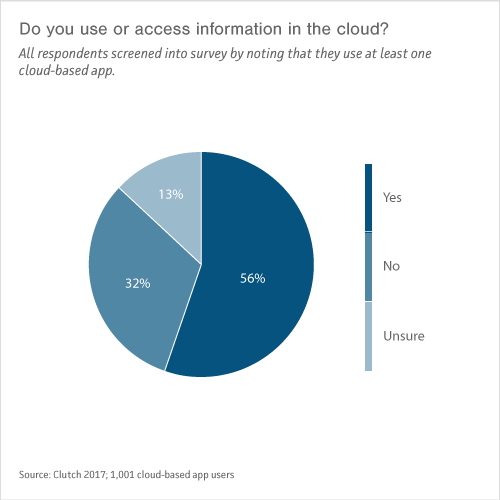The Internet, and the devices connected to it, are woven tightly into our daily lives. We use social media, stream audio and video, and store important documents and images online without hesitation. Yet, are you aware of when that data is stored locally and when it’s stored in the cloud?
A recent survey of 1,001 consumers – conducted by B2B research firm Clutch – found that nearly one-third of respondents who are active cloud users don’t know that they use the cloud. Though the respondents indicated that they use at least one popular cloud-based application, such as Google Drive or Dropbox, 32% subsequently marked that they do not use or access information in the cloud.
By design, the survey did not specify that these popular applications are cloud-based. This shows that many users of these widely prevalent apps do not understand the technology driving them.
Not understanding the mechanisms behind technology is often harmless. The cloud can be a different beast, though. If you are storing potentially sensitive information in the cloud and aren’t acting appropriately, you leave yourself vulnerable to rare, but possible breaches.
Get Educated
Once someone knows they are using the cloud, they need to be aware of the potential security risks involved with using it, and ways to mitigate that risk. There are a variety of simple steps you can take to protect your data in the cloud.
Some of these steps include the following:
- Use strong passwords that can’t be guessed by those who curate information about you. Create passphrases with numbers, mixed upper/lower cases and special characters. Don’t include words that can be guessed, like your pets’ names, your children’s names or places you’ve lived.
- Change your password regularly.
- Subscribe to services which enforce multi-factor authentication, such as using passcodes received through an SMS text or challenge questions.
- Use services that have strong SSL encryption, indicated by a URL starting with “https://”.
- Research the reputation of the cloud storage provider from the perspective of 3rd party reviews.
- Install anti-spyware software, anti-virus software or other security measures on your mobile device and laptop. If possible, use an app which allows you to render your device useless if it’s stolen or lost.
- Employ VPN services in public places when using cloud applications. A VPN is like a secure tunnel for your information to protect you when using public WiFi.
By adopting some of these tools and behaviors, consumers will find the cloud can be a secure place to store their important documents, valued photos and other files – without needing to become a cloud expert.
Take Responsibility for Cloud Security
There have been high-profile cases of individuals having their personal files stolen by opportunistic hackers in public places. Compromising photos and sensitive documents stored in the public cloud can be copied without the victim’s knowledge. Identity theft, harassment and humiliation are often the result of lax behaviors related to safeguarding cloud data.
The survey found that just over 40% percent of those surveyed feel cloud security is a shared responsibility between the cloud service provider and user.
Just under a third of respondents believe that the burden of security falls exclusively on the cloud provider. This thinking is misguided. Would you leave your house without locking the door or securing your valuables? In a perfect world, this would be acceptable, but that unfortunately is not reality.
Companies like Apple, Dropbox, Google, Amazon and Microsoft work around the clock to ensure your files are safe from hackers that try to breach their network perimeter. They offer a great deal of security for little or no cost – but cloud hacks are often the fault of the user. Weak passwords and careless behavior in public places often leads to stolen information and personal files.
The survey summarizes that if consumers educate themselves about the cloud, including opportunities and threats, they will be better equipped to get more value from it, and to protect their sensitive files from those who prey on unsuspecting individuals.
Not Everything Belongs in the Public Cloud
There are some personal files, like tax returns, passport images or other financial and legal documents, that should be stored on your computer’s local hard drive instead of the public cloud. Cloud services are generally highly secure, but as Ben Franklin famously said, “An ounce of prevention is worth a pound of cure.”
There is a lot of information available to consumers to enhance their cloud knowledge on the best online storage solution for their needs. Selecting a cloud storage provider just because it is free is a decision fraught with risk. Instead, opt for a service which works well with your devices, has a proven track record for keeping information safe, and is backed by a reputable service provider. It is easy and affordable to buy additional storage when you need it, but recovering from a data breach is generally a complex and expensive process.
Read Clutch’s full report here.
